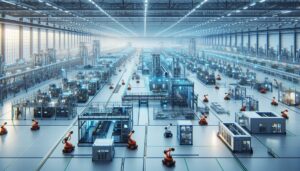In the rapidly evolving landscape of manufacturing, technological advancements are reshaping internal logistics.
Industrial robot manufacturers are at the forefront of this transformation, driving efficiency and innovation. Mobile robots, particularly those like MiR, are revolutionizing transportation within factories.
Technological advancements in internal logistics have become a cornerstone for modern manufacturers. With the integration of mobile robots and sophisticated automation systems, the efficiency and productivity of manufacturing processes have significantly improved. This transformation is not just a trend but a vital evolution to stay competitive in today’s market.
The Rise of Industrial Robots
Industrial robot manufacturers have been pivotal in advancing the capabilities of modern factories. These manufacturers are continuously developing robots that can perform a variety of tasks, from assembly to packaging, with precision and speed. What is important is understanding how these robots can seamlessly integrate into existing workflows, enhancing productivity while reducing operational costs.
The emergence of mobile industrial robots in the middle of a production line showcases how adaptable these machines can be. They are designed to navigate complex environments autonomously, which is especially beneficial for handling materials and transporting goods across large facilities. This ability to adjust to various tasks makes them invaluable assets in streamlining internal logistics.
The versatility of industrial robots extends beyond traditional manufacturing tasks. Many industrial robot manufacturers are now developing ‘cobots,’ or collaborative robots, designed to work alongside human employees. These cobots are equipped with advanced safety features and intuitive programming interfaces, making them accessible to a wider range of industries. As a result, even small and medium-sized enterprises can now leverage the benefits of robotics in their production processes, leveling the playing field in competitive markets.
Advantages of Mobile Robots
Mobile robots are transforming the landscape of internal logistics by offering unprecedented levels of flexibility and efficiency. Unlike traditional fixed automation systems, mobile robots can be reprogrammed and repurposed for different tasks, providing a dynamic solution for constantly shifting manufacturing needs. Their implementation has shown to improve not only operational efficiency but also overall safety within manufacturing plants.
These robots are equipped with advanced sensors and navigation systems that allow them to operate safely alongside human workers. This collaborative aspect ensures that while the robots handle repetitive or hazardous tasks, human employees can focus on more strategic roles. As a result, companies can achieve higher levels of productivity without compromising on worker safety or job satisfaction.
Another significant advantage of mobile robots is their ability to collect and analyze data in real-time. As they move through the facility, these robots can gather information on production flow, inventory levels, and equipment performance. This data can be leveraged to identify inefficiencies, predict maintenance needs, and optimize overall operations. By providing valuable insights, mobile robots not only improve current processes but also contribute to long-term strategic planning and continuous improvement initiatives.
Impact on Transportation Within Factories
The implementation of transportation robots like MiR (Mobile Industrial Robots) has significantly enhanced the movement of materials within factories. These robots are capable of transporting goods efficiently across large manufacturing floors without the need for human intervention. By automating these transportation tasks, companies can reduce labor costs and minimize the risk of human error.
Furthermore, transportation robots contribute to a more organized and streamlined production environment. They ensure that materials are delivered to the right place at the right time, thus preventing bottlenecks and delays in the production process. This level of precision is crucial for maintaining a smooth workflow and consistently meeting production deadlines.
The integration of mobile robots like MiR into factory transportation systems also contributes to improved sustainability efforts. These electric-powered robots reduce the need for traditional gas-powered forklifts and other vehicles, significantly decreasing the carbon footprint of manufacturing operations. Additionally, their precise navigation and optimized routing capabilities minimize unnecessary movement, further conserving energy and reducing wear and tear on factory floors. This eco-friendly approach not only aligns with corporate sustainability goals but can also lead to cost savings in energy consumption and facility maintenance.
The Future of Internal Logistics
The future of internal logistics lies in further integrating advanced technologies such as artificial intelligence (AI) and machine learning with existing automation systems. Industrial robot manufacturers are already exploring ways to incorporate AI-driven analytics to predict maintenance needs and optimize robotic operations. This proactive approach not only extends the lifespan of the equipment but also ensures uninterrupted production cycles.
As mobile robots continue to evolve, their capabilities will expand beyond simple transportation tasks. Future developments may include more complex functions such as quality control inspections or real-time inventory management. Such advancements will enable manufacturers to create smarter, more responsive production environments that can adapt quickly to market demands.
In summary, the ongoing advancements in industrial robotics and automation are set to revolutionize internal logistics for manufacturers. By embracing these technologies, companies can achieve greater efficiency, reduce costs, and enhance overall productivity. The continued innovation from industrial robot manufacturers will undoubtedly influence the future landscape of manufacturing, making it more agile and resilient than ever before.

























